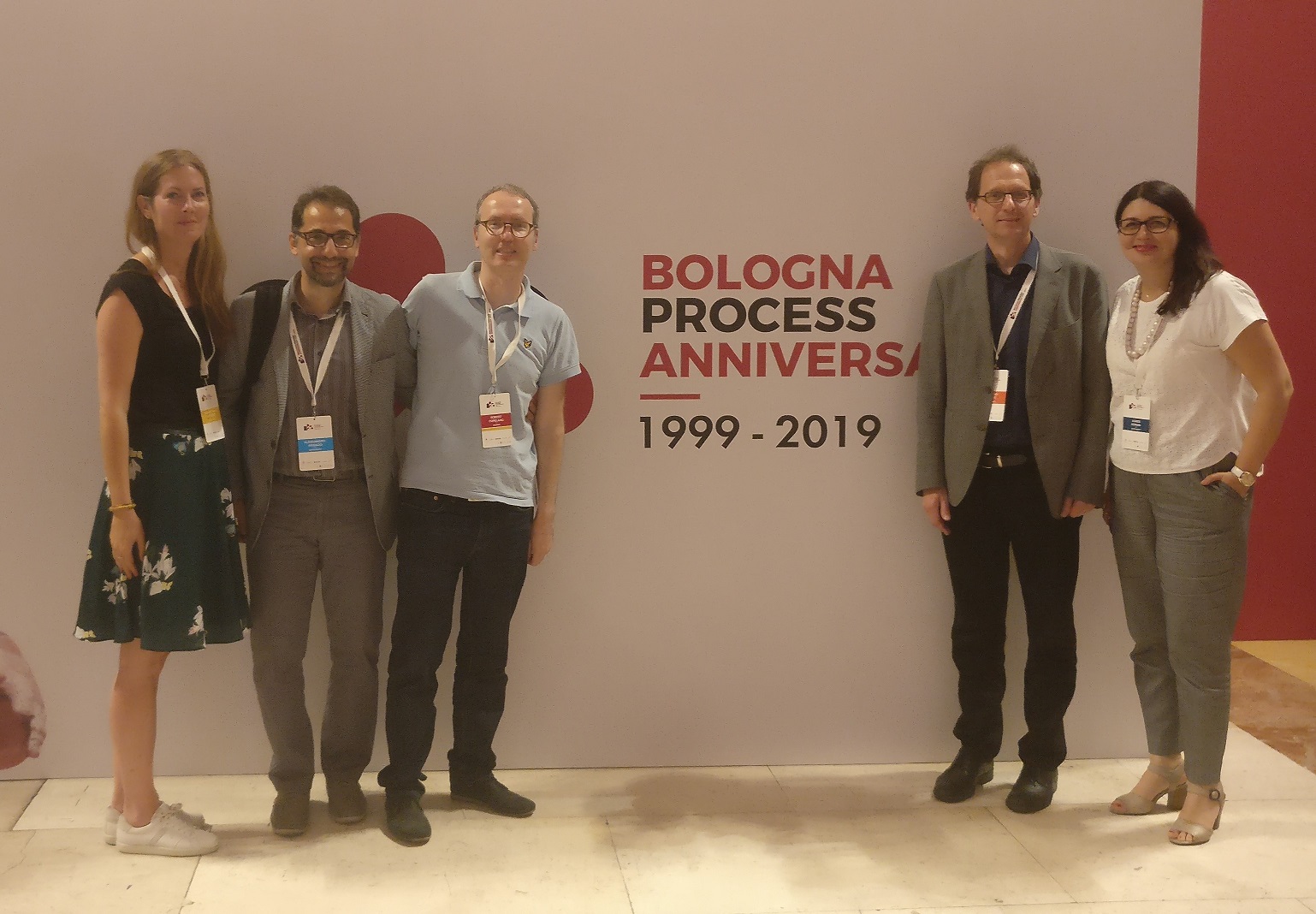ETUCE on the 20th Anniversary of the Bologna Process: Academic freedom must be more safeguarded than ever
Published:
On 24-25 June, 2019 the Italian Ministry of Education, University and Research, which holds the Secretariat of the Bologna Follow-Up Group until 2020, organised a major event in cooperation with the University of Bologna, the Magna Charta Universitatum, EUA, ESU and other partners for celebrating the 20th Anniversary of the Bologna Process.
The 20th Anniversary conference focused on the following topics: academic and related civic values in changing societies; student-centred learning; the role of Higher Education in providing leadership for sustainable development; the social dimensions of Higher Education; and careers and skills for the labour market of the future. More information about the event can be found here: http://bolognaprocess2019.it/
The ETUCE delegation was composed of ETUCE Vice-President Andreas Keller, HERSC Chair Rob Copeland, HERSC vice-chair Alessandro Arienzo, HERSC member Jorunn Dahl Norgard, and ETUCE senior coordinator Agnes Roman.
Rob Copeland’s speech concentrated on safeguarding academic freedom in market-led systems of higher education. He underlined that academic freedom and institutional autonomy are under attack as a result of rising political authoritarianism. Studies show regressive developments include politically-driven closures of individual universities and subject areas and the mass dismissal of academic staff. Freedom from political intervention and pressure, however, is essential in enabling European universities to fulfil their role as bastions of critical thinking and independent judgement, and staff, students and rectors have a key role to play in defending institutional autonomy and academic freedom as preconditions for quality higher education and research.
At the same time, the principle and practice of academic freedom is also being undermined by the marketisation and commercialisation of higher education, sometimes under the guise of promoting greater ‘institutional autonomy’. Policies such as the increased use of performance-based funding, the reliance on fixed-term contracts for academic staff and the shift towards corporate forms of institutional governance are weakening the right to teach without any interference, the freedom to research and disseminate the results and the ability to participate in representative bodies as defined by the 1997 UNESCO recommendation concerning the status of higher education teaching personnel.
He reminded the participants the demands of ETUCE member organizations for ensuring quality higher education adding that “ETUCE believes that governments and institutions need to pay greater attention to measuring, monitoring and mitigating the effects of such policies on academic freedom. Moreover, the success of the EHEA after 2020 requires a greater focus on core public investment in higher education, a supportive working environment for staff, a better balance between teaching and research in the academic career and an institutional process that is underpinned by genuine social dialogue and collegial governance”.
The conference put special emphasis on the fundamental values in the European Higher Education Area, an important topic which was the focus of the latest Communique adopted by ministers of education of all 48 countries of the Bologna Process last year. This Communique acknowledged the importance of academic freedom and integrity, institutional autonomy, and involvement of the staff in the governance as fundamental values:
“Academic freedom and integrity, institutional autonomy, participation of students and staff in higher education governance, and public responsibility for and of higher education form the backbone of the EHEA. Having seen these fundamental values challenged in recent years in some of our countries, we strongly commit to promoting and protecting them in the entire EHEA through intensified political dialogue and cooperation.”
The abstract of the research of Jorunn Dahl Norgard and Jon Wikene Iddeng will be also included in the book of the anniversary conference. They remind that key policy documents from governmental and cross-national bodies (including the UNESCO declarations, the EU Charter and Code for Researchers, the European Commission’s Renewed Agenda for Higher Education, and the Paris Communiqué underline academic freedom and terms of employment as crucial for quality in teaching and research. Yet, a number of studies have made it clear that the working conditions and future prospects for young researchers have deteriorated following austerity measures and changes in funding of higher education institutions after the 2008 financial crisis. These reports confirm that early-career academics face more uncertain employment conditions and career prospects. A growing number of academics are temporarily employed outside a recognized career path. Accordingly, they do not get access to career-developing measures, such as sabbatical leave, continuous professional development and support resources and besides they are deprived social benefits. Their work underlines that supportive working environments are essential to the future success of EHEA, and should be made a strategic priority and monitored more closely via the Bologna Process in line with the implementation of the Paris Communiqué.